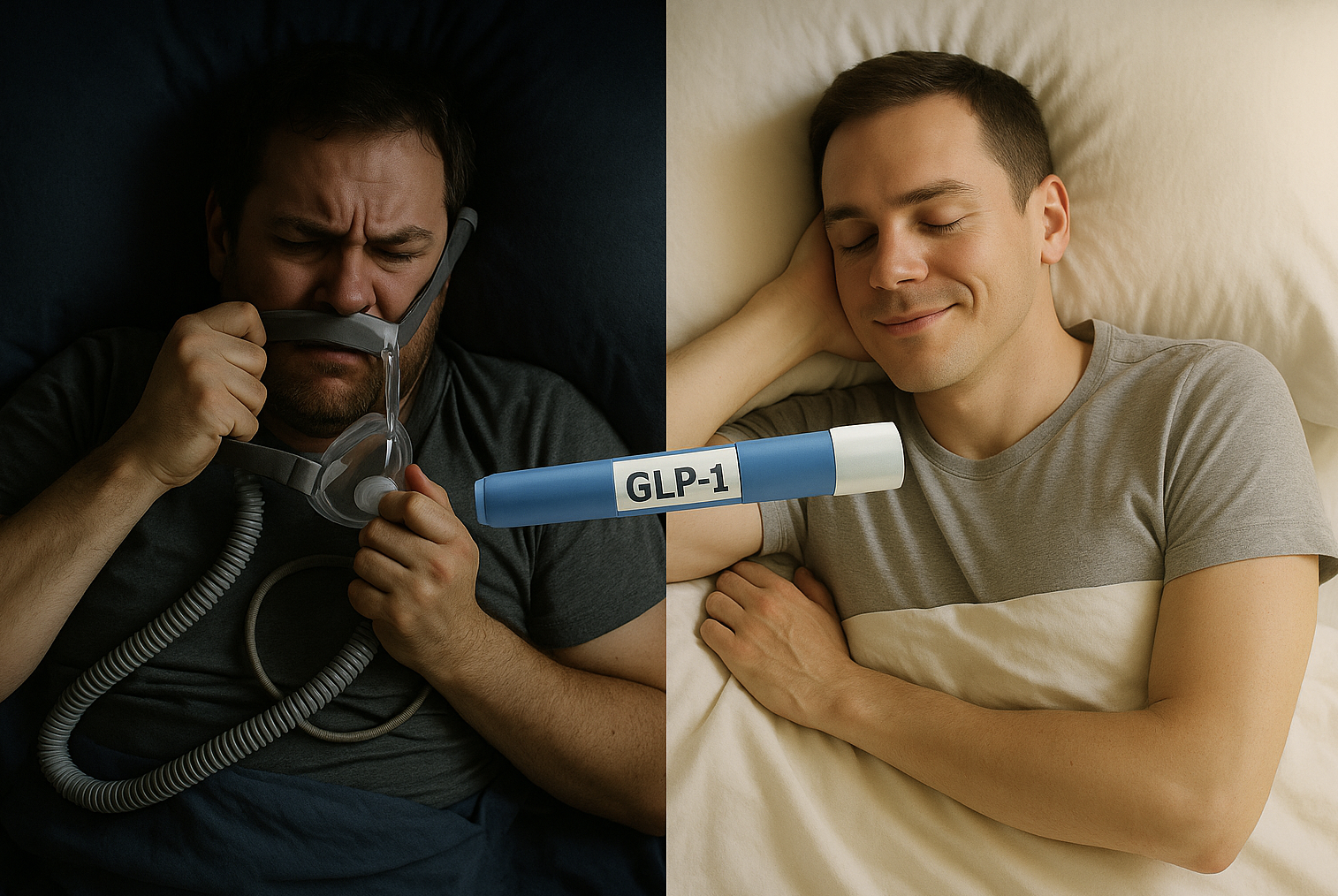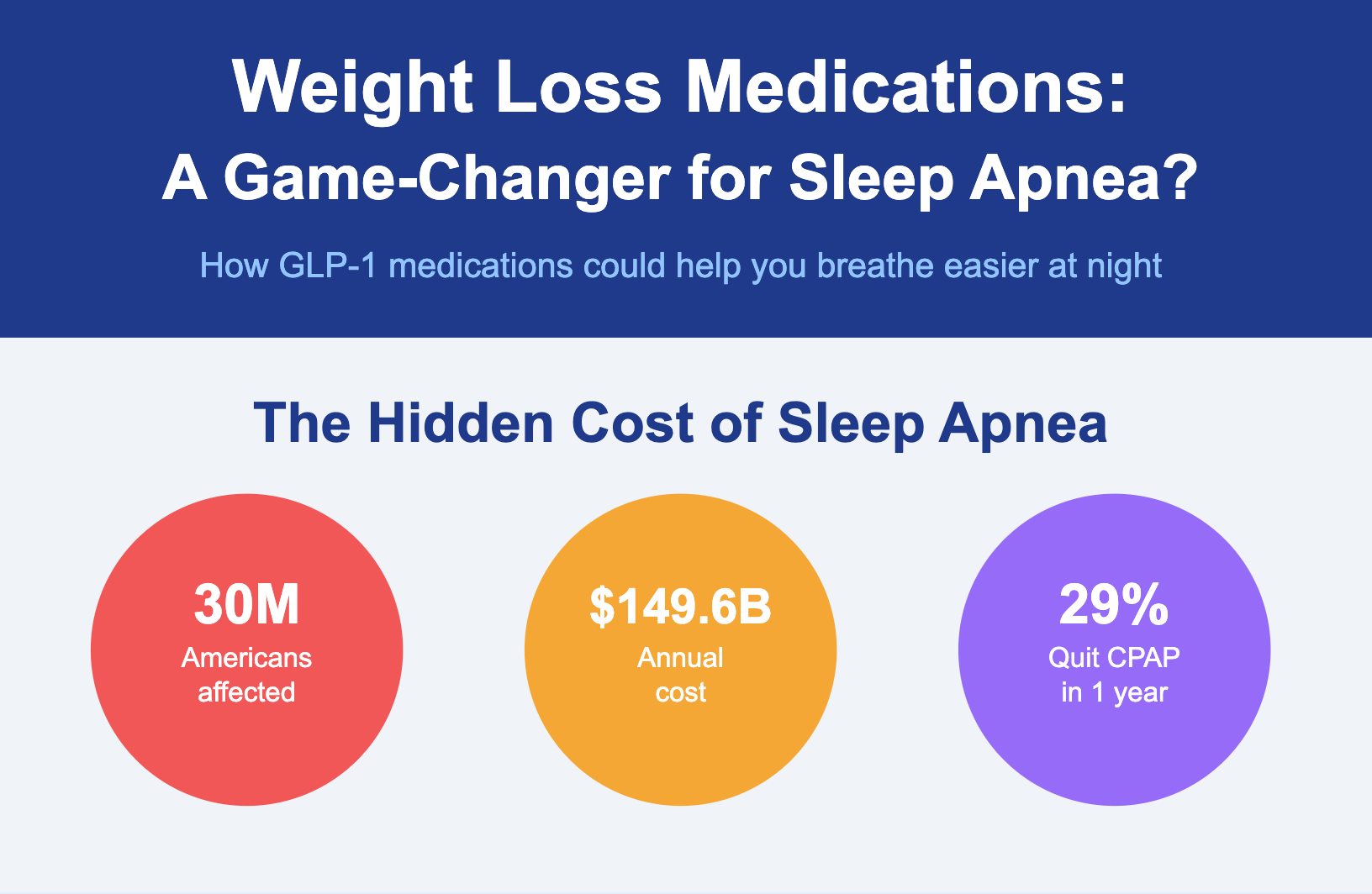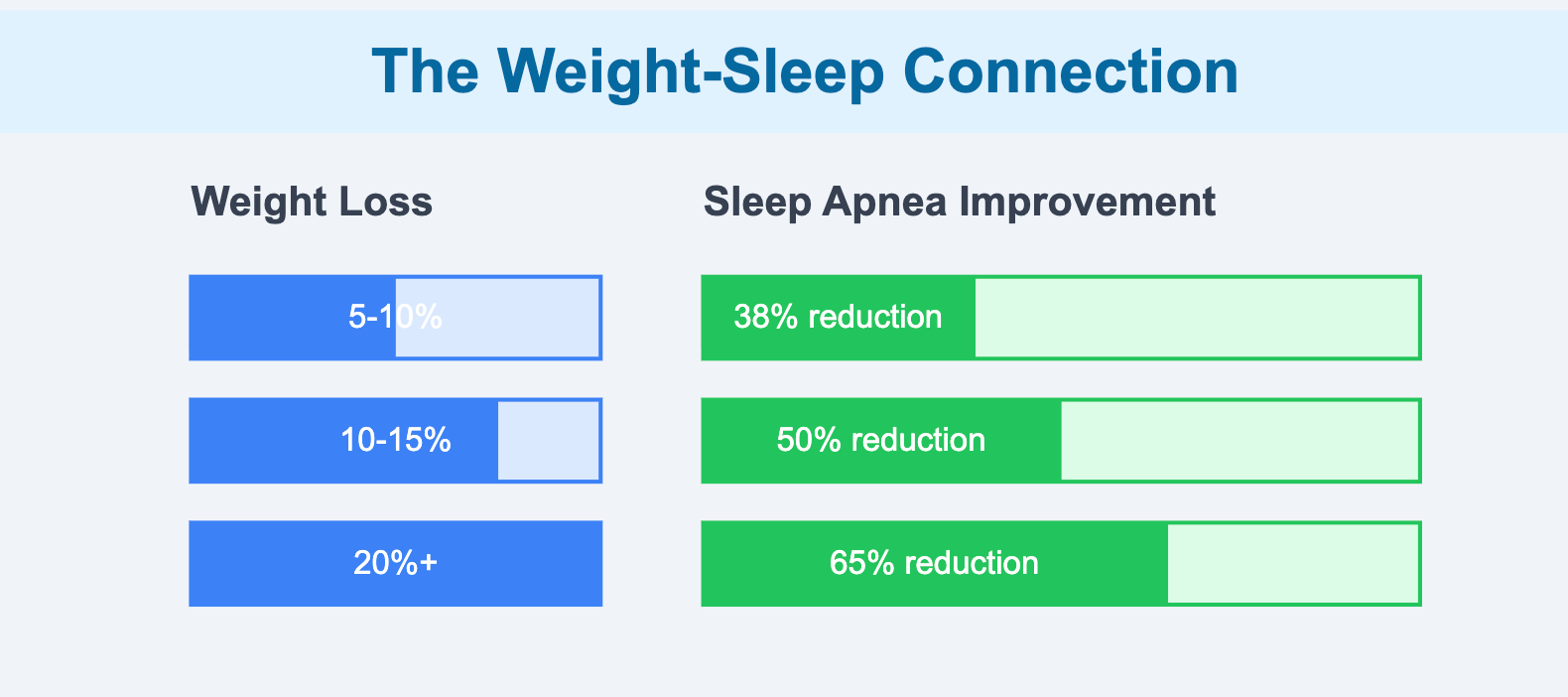Could Weight Loss Medications Be the Game-Changer for Your Sleep Apnea?

Imagine waking up refreshed, energized, and actually feeling like you slept—without being tethered to a CPAP machine every night. For millions of Americans struggling with sleep apnea, this might sound like a dream. But here's some exciting news: the same medications making headlines for weight loss could be your ticket to breathing easier at night.
If you're one of the 30 million adults in the U.S. dealing with sleep apnea, you know the drill. The snoring that keeps your partner awake. The constant fatigue that makes you feel like you're running on empty. Maybe you've tried CPAP therapy and found yourself among the 29% of users who give up within the first year because, let's face it, sleeping with a mask strapped to your face isn't exactly comfortable.
But what if there was another way? What if losing weight with the help of GLP-1 medications like Wegovy or Zepbound could actually treat your sleep apnea—or even make it disappear entirely?
The Hidden Cost of Those Restless Nights
Before we dive into this breakthrough, let's talk about why this matters so much. Sleep apnea isn't just about snoring or feeling tired. It's creating a massive economic burden that might surprise you. Undiagnosed sleep apnea costs the United States a staggering $149.6 billion every year. That's billion with a "B."
Where does all that money go? Well, $86.9 billion is lost in workplace productivity because people with untreated sleep apnea are exhausted, unfocused, and more likely to call in sick. Another $26.2 billion goes to motor vehicle accidents caused by drowsy driving. Add in increased healthcare costs and workplace accidents, and you've got a public health crisis hiding in plain sight.
On a personal level, if you have untreated sleep apnea, you're likely spending more on healthcare, potentially missing out on promotions at work due to fatigue, and putting yourself at risk every time you get behind the wheel. Not to mention the strain it puts on relationships when your snoring sounds like a freight train.
The Weight-Sleep Connection You Need to Know
Here's something that might blow your mind: there's a direct mathematical relationship between your weight and your sleep apnea severity. For every 10% of body weight you gain, your risk of developing sleep apnea increases six-fold. But here's the good news—it works in reverse too!
Research shows that weight loss improves sleep apnea in a predictable pattern:
- Lose 5-10% of your body weight? You'll see moderate improvements
- Lose 10-15% of your body weight? Your sleep apnea severity could drop by 50%
- Lose 20% or more? Many people see their sleep apnea completely resolve
Think about it this way: if you weigh 200 pounds and lose 20-40 pounds, you could cut your sleep apnea severity in half. For some people, losing 40 pounds or more means saying goodbye to sleep apnea entirely.

Enter the Game-Changers: GLP-1 Medications
You've probably heard about medications like Ozempic, Wegovy, and Zepbound in the context of weight loss. These GLP-1 receptor agonists work by mimicking a hormone your body naturally produces after eating. They slow down digestion, reduce appetite, and help you feel satisfied with less food.
But here's where it gets really interesting. In groundbreaking clinical trials called SURMOUNT-OSA, researchers discovered something remarkable. People with moderate-to-severe sleep apnea who took tirzepatide (Zepbound) didn't just lose weight—they experienced dramatic improvements in their sleep apnea.
The numbers are pretty incredible:
- Participants lost an average of 18-20% of their body weight over 12 months
- Sleep apnea severity decreased by 55-63%
- 42-50% of participants saw their sleep apnea go into remission or become so mild it no longer needed treatment
Let me put that in perspective. If you currently have 30 breathing interruptions per hour (moderate sleep apnea), these medications could reduce that to 10-12 interruptions per hour—moving you into the "mild" category where many people don't even need treatment.
Real Results That Beat CPAP
Now, I know what you might be thinking: "But isn't CPAP the gold standard for sleep apnea treatment?"
Technically, yes. CPAP can reduce sleep apnea events by about 85% when used properly. But here's the catch—that "when used properly" part is where things fall apart for many people. Real-world studies show that only about 60% of people actually use their CPAP as prescribed. Many find it uncomfortable, claustrophobic, or just plain annoying.
With GLP-1 medications, you're not just treating the symptom (blocked airways)—you're addressing one of the root causes (excess weight). Plus, let's be honest: taking a weekly injection is a lot more convenient than wrestling with a CPAP mask every single night.

What to Expect on Your Journey
If you're considering this approach, here's what the timeline typically looks like:
Months 1-3: You'll start seeing weight come off, usually about 5-8% of your starting weight. You might notice you're snoring less and waking up slightly more refreshed.
Months 3-6: This is when the magic really happens. As you approach 10-15% weight loss, many people report dramatic improvements in their sleep quality. Partners often comment that the snoring has decreased significantly.
Months 6-12: By this point, if you've lost 15-20% of your body weight, you might find that your sleep apnea has improved so much that you no longer need CPAP at all. Many people describe it as getting their life back.
The FDA Just Changed the Game
Here's breaking news that's huge for sleep apnea sufferers: The FDA recently approved Zepbound as the first medication specifically for treating moderate-to-severe obstructive sleep apnea in adults with obesity. This isn't just another weight loss drug—it's now an official sleep apnea treatment.
This approval could be a game-changer for insurance coverage. While these medications can cost $1,000-1,500 per month without insurance, having FDA approval for sleep apnea treatment may make it easier to get coverage, especially if you've tried and failed with CPAP therapy.
Is This Right for You?
GLP-1 therapy for sleep apnea might be a good fit if you:
- Have moderate-to-severe sleep apnea (AHI of 15 or higher)
- Have a BMI of 30 or higher
- Have tried CPAP and couldn't tolerate it
- Are motivated to make lifestyle changes alongside medication
- Want to address other weight-related health issues simultaneously
Of course, these medications aren't without side effects. The most common ones are gastrointestinal—nausea, vomiting, and diarrhea—especially when first starting. Most people find these side effects manageable and they often improve over time.
The Bottom Line
For years, people with sleep apnea have faced a frustrating choice: struggle with CPAP therapy or live with the consequences of untreated sleep apnea. Now, there's a third option that addresses the root cause for many people—excess weight.
The evidence is clear: losing 15-20% of your body weight can reduce your sleep apnea severity by 50-60% or more. For many people, that's the difference between needing nightly CPAP therapy and breathing freely on their own. With GLP-1 medications showing average weight loss of 15-23%, this goal is more achievable than ever.
If you're tired of being tired, if you're done fighting with your CPAP machine, or if you're worried about the long-term health effects of untreated sleep apnea, it might be time to talk to your doctor about whether GLP-1 therapy could work for you.
Remember, this isn't just about losing weight or stopping snoring. It's about reclaiming your energy, protecting your health, and maybe even saving your relationship (because let's face it, your partner deserves a good night's sleep too).
The path to better sleep might not be through another mask or machine—it might be through addressing the weight that's been weighing down your airways. And with these new treatment options, that path is clearer than ever before.
Sweet dreams might be closer than you think.

